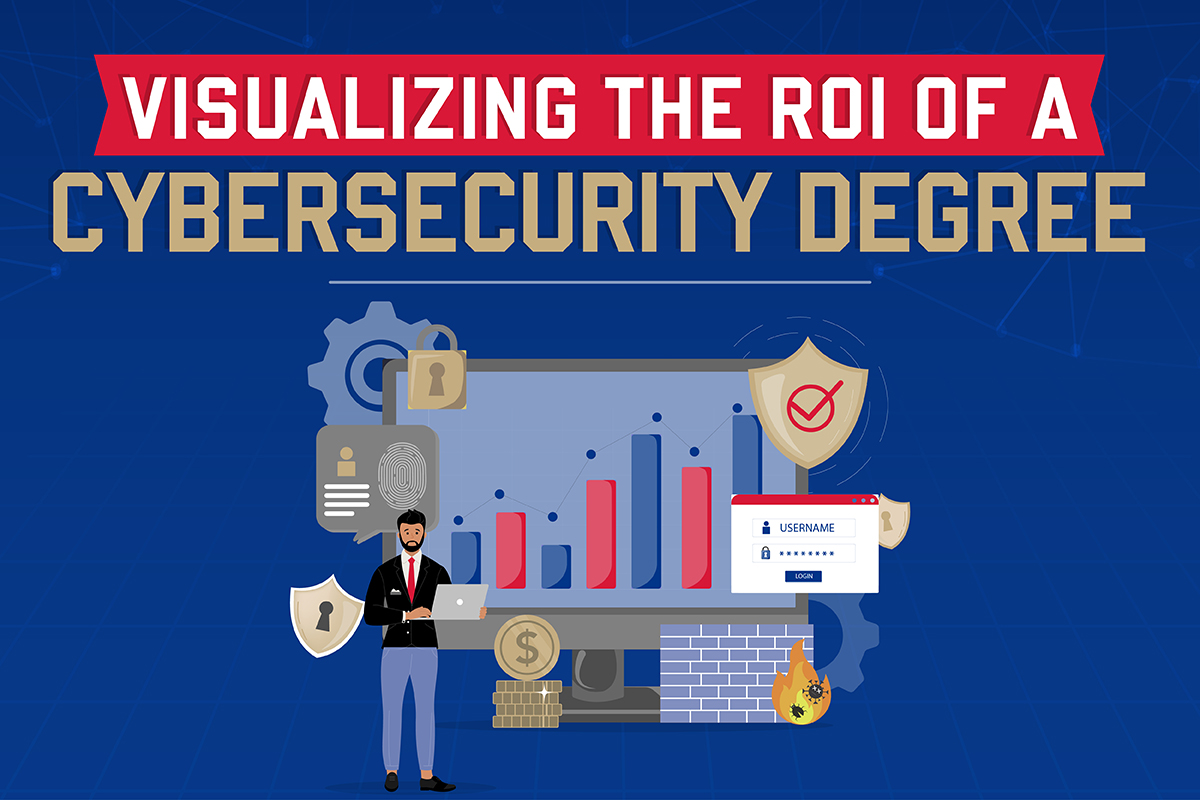What Do You Learn in Cybersecurity?
Written by:
University of Tulsa
• Dec 8, 2023

The breadth of the cyber threat landscape cannot be overstated. Though U.S. companies lose billions of dollars to cybercrime each year, cybercriminals aren’t just digital thieves. Sometimes, they’re spies and terrorists looking to infiltrate and shut down the systems that sustain countries. In other words, hackers don’t just drain bank accounts and steal people’s identities; they also cripple infrastructure and topple governments.
In 2020, a Russian hacking campaign made headlines for its breadth and depth. The nine-month-long SolarWinds hack created a back door in common network monitoring software that gave attackers access to systems used by the Pentagon, United States Treasury, Department of Homeland Security (DHS), and other federal agencies. According to the DHS, “Our daily life, economic vitality and national security depend on a stable, safe and resilient cyberspace.”
While securing data and networks is more important than ever, there aren’t enough cybersecurity experts to keep everything and everyone safe. According to ISC2’s 2024 Cybersecurity Workforce Study, the cybersecurity workforce gap in 2024 was over 4.7 million. The upside to this number is that it represents an opportunity for anyone who has completed a master’s program with a comprehensive cybersecurity curriculum.
A bachelor’s degree was once all it took to launch a career in the high-demand, high-impact cybersecurity field. Today, a master’s in cybersecurity is becoming the entry-level degree for security professionals. Earning the degree can lead to several intriguing professional paths that reaffirm cybersecurity’s status as a promising career. However, if you’re prepared to make that step to earning an advanced degree, it’s important to understand what you learn in cybersecurity at an advanced level.
Who Typically Earns a Cybersecurity Master’s Degree?
Many M.S. in Cyber Security candidates have academic or professional backgrounds in areas of technology, such as computer science, network engineering, information technology (IT) and information systems management, software development, or system administration. Programs may admit students into a program based on the condition that they take leveling courses in information technology and computer programming before the end of the first semester.
Graduates may pursue many different roles in various industries. Some will pivot into technical roles in information assurance and system security. Others will take what they learn and apply it in their IT or information management careers. Still, others will use their new credentials to climb the corporate ladder.
What Will You Learn in a Cybersecurity Master’s Program?
M.S. in Cyber Security students will engage in real-world practice with the latest digital security technologies and acquire hands-on skills by participating in labs administered by expert faculty through remote virtual machines. The core cybersecurity curriculum includes courses focused on the fundamentals of this multifaceted discipline.
Foundations of Cyber Security
This course uses virtual classroom discussions and hands-on project work to help you hone skills related to the security of socio-technical systems, the threats to those systems, and the countermeasures professionals use to keep them safe. Coursework touches on software security, malware, keylogging, data loss, and privacy, as well as the economic, legal, and ethical issues that make cybersecurity a society-wide issue.
Information Security Program Management
In this course, you’ll explore the essential cybersecurity skills and technologies modern organizations use to keep their digital assets safe. Coursework covers security frameworks and documented best practices, as well as information security risks, threats, and vulnerabilities, all based on internationally recognized frameworks and best practices.
Information System Assurance
This course will expose you to core information systems security concerns, including information access, exchange, and flow within a system. You’ll also dive into mitigation strategies that can improve information assurance. Additionally, the coursework involves a substantial examination of National Institute of Standards and Technology (NIST) documents, which can help you get familiar with process standardization guidelines, including how these guidelines can be applied.
Network Security Concepts and Applications
In this course, you’ll learn skills related to the principles of computer networks and network security design and operation, including requirements, connectivity levels, layered architectures, and applications. Skill-building in this course is centered on core perimeter security fundamentals, secure networks, incident response, design fundamentals, and security assessments.
Systems Security and Cryptography
This course allows you to explore the technical aspects of computer, network, and information system security in greater depth, as well as the fundamentals and applications of cryptography. Coursework touches on access control, authentication, secure communication, and auditing as well as security system design, engineering, and operation.
Security Audit and Penetration Testing (I and II)
These lab courses provide a controlled environment for you to apply ethical hacking techniques to understand how cybercriminals attack networks. You’ll also learn advanced ethical hacking and penetration testing techniques, such as privilege escalation, exploit frameworks, network evasion, and multi-stage attack chains.
Cyber Security Law and Policy
In this course, you’ll learn about the legal, technical, and logical dimensions of computer systems, information, and network security. This course doesn’t teach technical skills for cybersecurity. Instead, it covers topics such as data security regulation, security breach law, cybersecurity litigation, anti-hacking laws, emerging national security threats, and cyber warfare — all of which you’ll need to understand to ensure your work is ethical and on solid legal ground.
Benefits of Earning a Master’s in Cybersecurity
What you learn in cybersecurity through a master’s program will help you establish a foundation of advanced knowledge. This acumen can translate to a wide range of benefits that can be advantageous to your career path as it evolves.
Advanced Skills
The coursework in a master’s program can augment fundamental skills you may already have, like cybersecurity coding and programming languages, with hard advanced competencies including digital defense strategies and computer operating systems. They can also help you fortify key soft skills that can position you for advanced cybersecurity roles, such as problem-solving, organization, and detail-oriented competencies.
Networking
Enrolling in a master’s program organically surrounds you with like-minded classmates and professors. These individuals can help you establish a professional network that can help provide guidance as your career grows. They may also help you forge connections that can lead to professional opportunities that align with your own interests.
Strong Job Outlook
The need to close the cybersecurity gap naturally translates to ample opportunity within several careers in the field. For instance, the U.S. Bureau of Labor Statistics (BLS) projects a 33% growth for information security analysts between 2023 and 2033. Because of factors such as increased cybercrime instances and increased points of vulnerability brought on by more connected devices, this demand for cybersecurity professionals is likely to keep rising.
Strong Compensation
Cybersecurity is an increasingly critical field, and the compensation associated with the field typically reflects this importance. This is particularly the case if you hold an advanced cybersecurity degree. According to Payscale, the median annual salary for those with a master’s in cybersecurity is $96,000 as of March 2024.
A Fulfilling Career
When you pursue a cybersecurity career, you’re taking on a role that’s going to be increasingly critical for a company’s success. You aren’t just filling a role. You’re helping to shape an organization’s future in a directly tangible way. This can make pursuing a cybersecurity career uniquely satisfying.
What You Can Do With a Master’s in Cybersecurity
The technical and professional skills for cybersecurity you’ll develop in The University of Tulsa’s part-time program are highly sought after by federal government agencies, national laboratories, law enforcement, and intelligence communities, as well as by private-sector businesses. In each of those spheres, numerous cybersecurity career pathways tend to fall into one of five categories.
- Risk analysis jobs involve identifying vulnerable information assets and quantifying risks so stakeholders can make informed decisions about security.
- Network security jobs involve protecting networking infrastructure from unauthorized access.
- Security software development jobs involve writing computer programs that safeguard systems and data.
- System security engineering jobs involve building secure systems.
- Security intelligence jobs involve identifying and mitigating threats to the nation’s communication infrastructure and the federal government’s sensitive data.
There are numerous interconnected titles within each of these broad categories. According to the National Initiative for Cybersecurity Careers & Studies, cybersecurity encompasses not only dozens of specialization areas but also more than 50 specific career roles. The breadth of this discipline can make it difficult to map out a “typical” career trajectory for master’s in cybersecurity graduates. You might start as a security analyst before becoming a cybersecurity consultant and then advance into a cybersecurity engineer position. Or you might work in quality assurance before transitioning into penetration testing or becoming a certified ethical hacker.
How Can You Focus Your Career?
Because there’s no blueprint for building a career in cybersecurity, it can be helpful to consider your interests and aptitudes in the context of the many specialty areas of cybersecurity. After what you learn in a cybersecurity master’s degree, you might specialize in application security, automation, cloud computing security, cryptography, digital forensics, or penetration testing. Or, you might not specialize in cybersecurity at all — at least not on paper.
Cybersecurity is a core task embedded in several advanced-level IT jobs, such as network and computer systems administrators. Employers across industries need qualified cybersecurity professionals, which means you’re as likely to work in aerospace, health care, or finance as you are to work in tech.
Is TU’s M.S. in Cyber Security the Right Degree For You?
Cybercriminals will always find ways to penetrate automated security systems as quickly as they are implemented and there will always be vulnerabilities caused by human error. Demand for a skilled workforce of highly trained cybersecurity professionals is rising.
If you don’t yet have any experience in the field of cybersecurity, enrolling in The University of Tulsa’s online M.S. in Cyber Security program can be the first step in your career transition. And if you do have experience, a graduate degree can be your ticket into those higher-paying, higher-profile management positions.
TU has a long-standing reputation for excellence in cybersecurity, with on-campus and online programs supported by the federal government, the National Security Agency (NSA), and the Department of Homeland Security (DHS). The university has been a designated Center of Academic Excellence in Cyber Defense since 2000 when it was one of the first 14 institutions awarded this distinction.
Scholarships and financial aid are available, and you can earn your degree in as few as 20 months. Continue in your current role and graduate prepared to become a technical and managerial leader in the world of cybersecurity.
Find out more about how the M.S. in Cyber Security from TU can prepare you to lead in cybersecurity.
Recommended Readings
Cybersecurity and Identity Management: How Are They Connected?
11 IT Security Tools for Cyber Professionals
What Is Machine Learning in Cybersecurity?
Sources:
Cooley PubCo, “Is the SEC’s Case Against SolarWinds Counterproductive?”
Indeed, 15 Careers in Cybersecurity
Indeed, What Is a Cybersecurity Degree? (With Courses and Benefits)
ISC2, 2024 ISC2 Cybersecurity Workforce Study
Payscale, Master of Science (MS), Cybersecurity Degree
TechTarget, “SolarWinds Hack Explained: Everything You Need to Know”
U.S. Bureau of Labor Statistics, Information Security Analysts
U.S. Bureau of Labor Statistics, Network and Computer Systems Administrators


